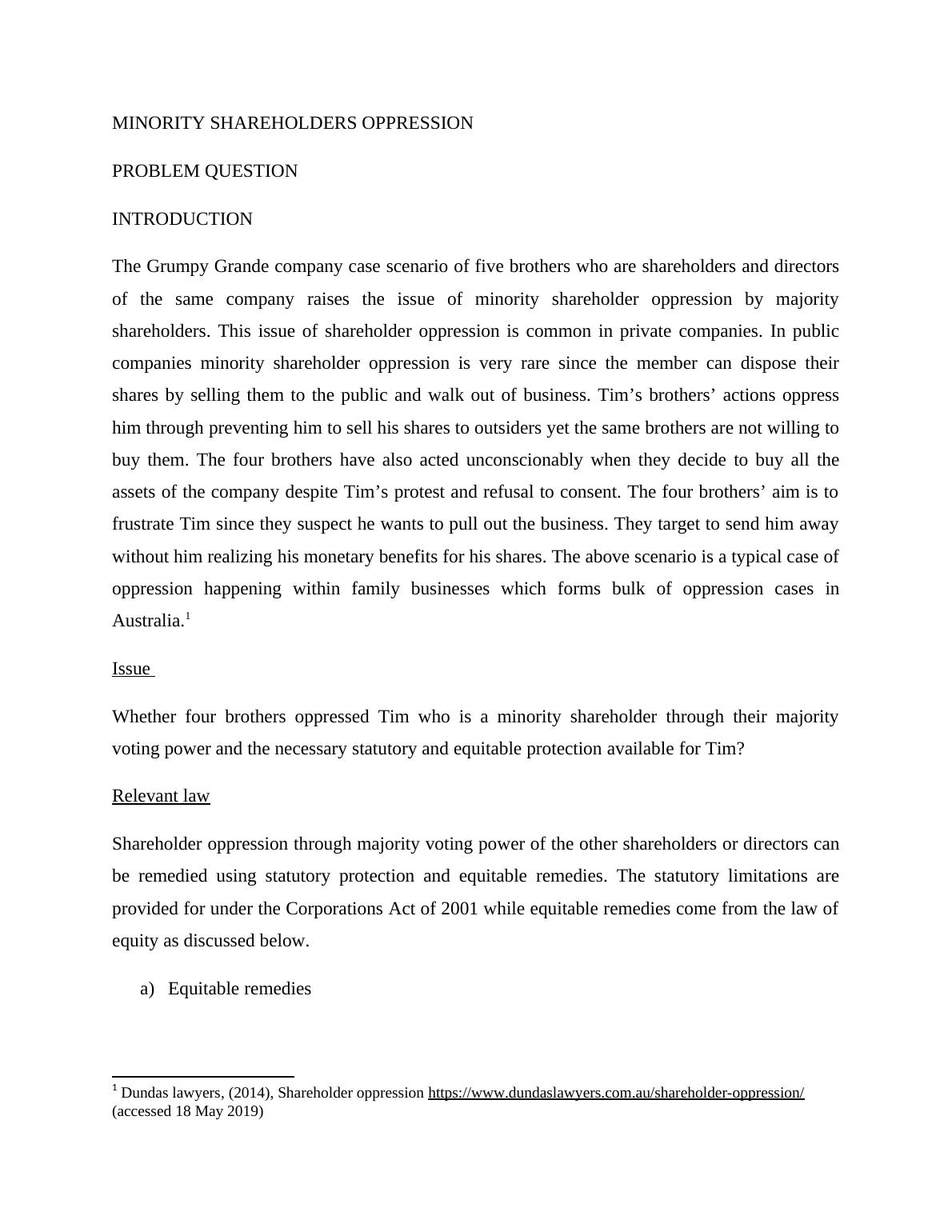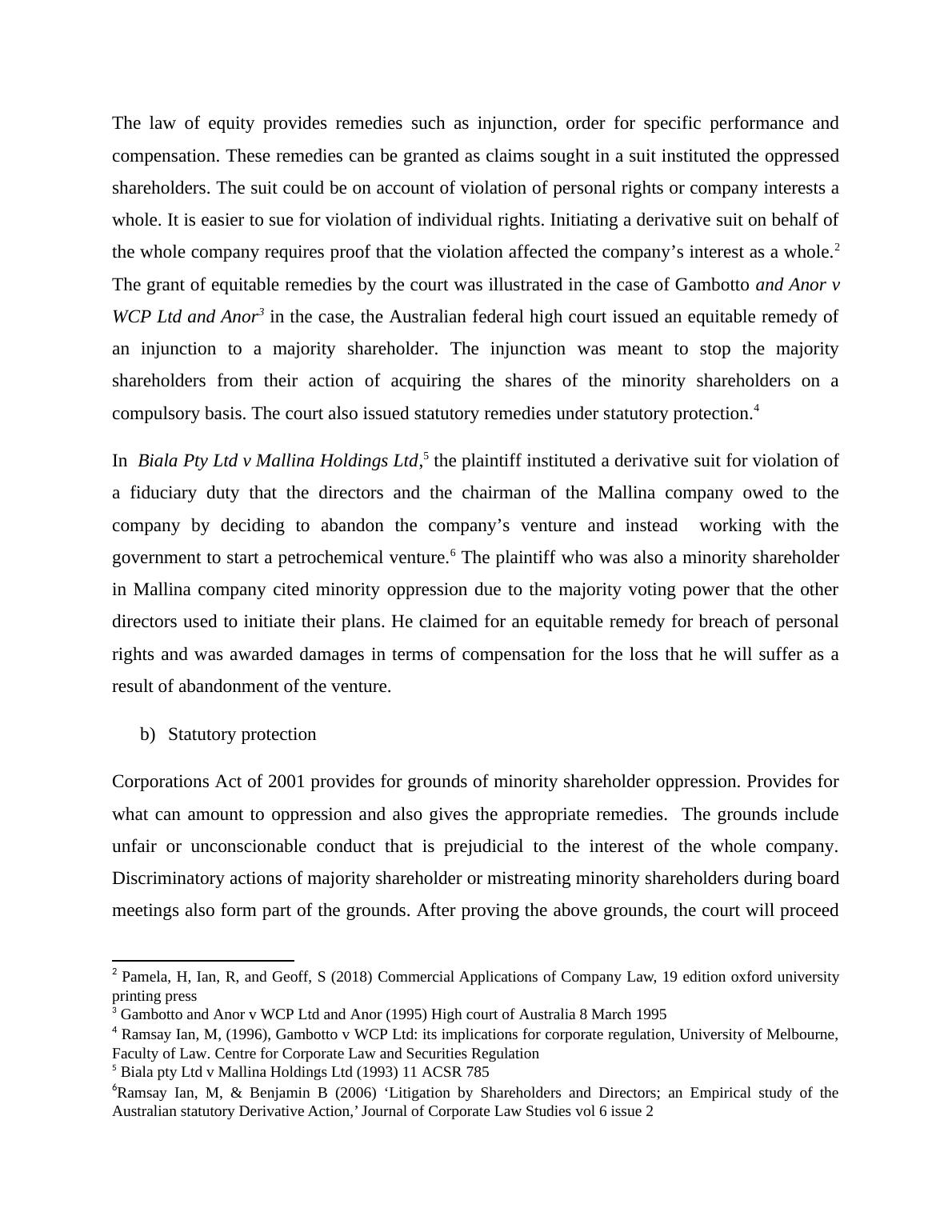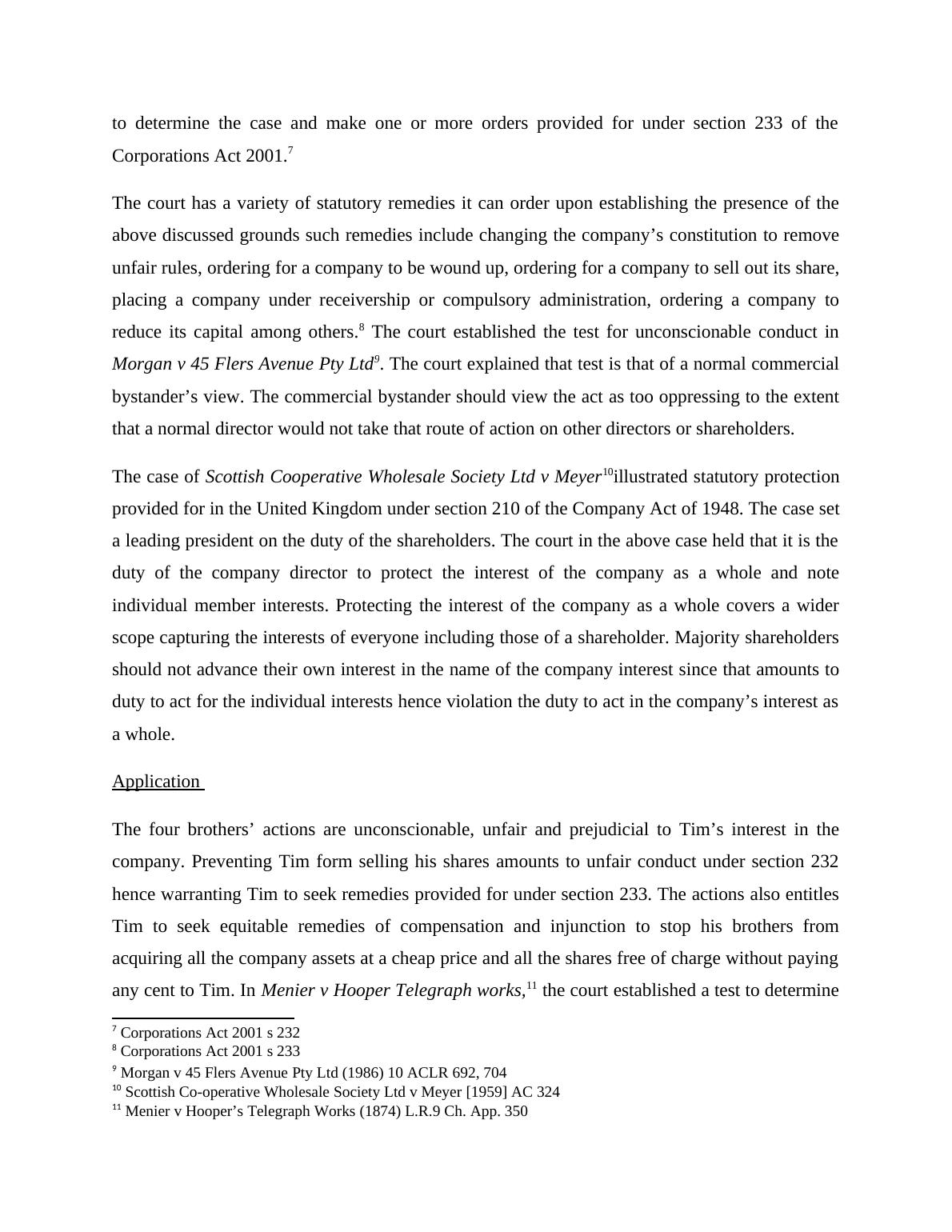Minority Shareholders Oppression: Protection and Remedies
Added on 2022-11-14
8 Pages2226 Words425 Views
MINORITY SHAREHOLDERS OPPRESSION
PROBLEM QUESTION
INTRODUCTION
The Grumpy Grande company case scenario of five brothers who are shareholders and directors
of the same company raises the issue of minority shareholder oppression by majority
shareholders. This issue of shareholder oppression is common in private companies. In public
companies minority shareholder oppression is very rare since the member can dispose their
shares by selling them to the public and walk out of business. Tim’s brothers’ actions oppress
him through preventing him to sell his shares to outsiders yet the same brothers are not willing to
buy them. The four brothers have also acted unconscionably when they decide to buy all the
assets of the company despite Tim’s protest and refusal to consent. The four brothers’ aim is to
frustrate Tim since they suspect he wants to pull out the business. They target to send him away
without him realizing his monetary benefits for his shares. The above scenario is a typical case of
oppression happening within family businesses which forms bulk of oppression cases in
Australia.1
Issue
Whether four brothers oppressed Tim who is a minority shareholder through their majority
voting power and the necessary statutory and equitable protection available for Tim?
Relevant law
Shareholder oppression through majority voting power of the other shareholders or directors can
be remedied using statutory protection and equitable remedies. The statutory limitations are
provided for under the Corporations Act of 2001 while equitable remedies come from the law of
equity as discussed below.
a) Equitable remedies
1 Dundas lawyers, (2014), Shareholder oppression https://www.dundaslawyers.com.au/shareholder-oppression/
(accessed 18 May 2019)
PROBLEM QUESTION
INTRODUCTION
The Grumpy Grande company case scenario of five brothers who are shareholders and directors
of the same company raises the issue of minority shareholder oppression by majority
shareholders. This issue of shareholder oppression is common in private companies. In public
companies minority shareholder oppression is very rare since the member can dispose their
shares by selling them to the public and walk out of business. Tim’s brothers’ actions oppress
him through preventing him to sell his shares to outsiders yet the same brothers are not willing to
buy them. The four brothers have also acted unconscionably when they decide to buy all the
assets of the company despite Tim’s protest and refusal to consent. The four brothers’ aim is to
frustrate Tim since they suspect he wants to pull out the business. They target to send him away
without him realizing his monetary benefits for his shares. The above scenario is a typical case of
oppression happening within family businesses which forms bulk of oppression cases in
Australia.1
Issue
Whether four brothers oppressed Tim who is a minority shareholder through their majority
voting power and the necessary statutory and equitable protection available for Tim?
Relevant law
Shareholder oppression through majority voting power of the other shareholders or directors can
be remedied using statutory protection and equitable remedies. The statutory limitations are
provided for under the Corporations Act of 2001 while equitable remedies come from the law of
equity as discussed below.
a) Equitable remedies
1 Dundas lawyers, (2014), Shareholder oppression https://www.dundaslawyers.com.au/shareholder-oppression/
(accessed 18 May 2019)

The law of equity provides remedies such as injunction, order for specific performance and
compensation. These remedies can be granted as claims sought in a suit instituted the oppressed
shareholders. The suit could be on account of violation of personal rights or company interests a
whole. It is easier to sue for violation of individual rights. Initiating a derivative suit on behalf of
the whole company requires proof that the violation affected the company’s interest as a whole.2
The grant of equitable remedies by the court was illustrated in the case of Gambotto and Anor v
WCP Ltd and Anor3 in the case, the Australian federal high court issued an equitable remedy of
an injunction to a majority shareholder. The injunction was meant to stop the majority
shareholders from their action of acquiring the shares of the minority shareholders on a
compulsory basis. The court also issued statutory remedies under statutory protection.4
In Biala Pty Ltd v Mallina Holdings Ltd,5 the plaintiff instituted a derivative suit for violation of
a fiduciary duty that the directors and the chairman of the Mallina company owed to the
company by deciding to abandon the company’s venture and instead working with the
government to start a petrochemical venture.6 The plaintiff who was also a minority shareholder
in Mallina company cited minority oppression due to the majority voting power that the other
directors used to initiate their plans. He claimed for an equitable remedy for breach of personal
rights and was awarded damages in terms of compensation for the loss that he will suffer as a
result of abandonment of the venture.
b) Statutory protection
Corporations Act of 2001 provides for grounds of minority shareholder oppression. Provides for
what can amount to oppression and also gives the appropriate remedies. The grounds include
unfair or unconscionable conduct that is prejudicial to the interest of the whole company.
Discriminatory actions of majority shareholder or mistreating minority shareholders during board
meetings also form part of the grounds. After proving the above grounds, the court will proceed
2 Pamela, H, Ian, R, and Geoff, S (2018) Commercial Applications of Company Law, 19 edition oxford university
printing press
3 Gambotto and Anor v WCP Ltd and Anor (1995) High court of Australia 8 March 1995
4 Ramsay Ian, M, (1996), Gambotto v WCP Ltd: its implications for corporate regulation, University of Melbourne,
Faculty of Law. Centre for Corporate Law and Securities Regulation
5 Biala pty Ltd v Mallina Holdings Ltd (1993) 11 ACSR 785
6Ramsay Ian, M, & Benjamin B (2006) ‘Litigation by Shareholders and Directors; an Empirical study of the
Australian statutory Derivative Action,’ Journal of Corporate Law Studies vol 6 issue 2
compensation. These remedies can be granted as claims sought in a suit instituted the oppressed
shareholders. The suit could be on account of violation of personal rights or company interests a
whole. It is easier to sue for violation of individual rights. Initiating a derivative suit on behalf of
the whole company requires proof that the violation affected the company’s interest as a whole.2
The grant of equitable remedies by the court was illustrated in the case of Gambotto and Anor v
WCP Ltd and Anor3 in the case, the Australian federal high court issued an equitable remedy of
an injunction to a majority shareholder. The injunction was meant to stop the majority
shareholders from their action of acquiring the shares of the minority shareholders on a
compulsory basis. The court also issued statutory remedies under statutory protection.4
In Biala Pty Ltd v Mallina Holdings Ltd,5 the plaintiff instituted a derivative suit for violation of
a fiduciary duty that the directors and the chairman of the Mallina company owed to the
company by deciding to abandon the company’s venture and instead working with the
government to start a petrochemical venture.6 The plaintiff who was also a minority shareholder
in Mallina company cited minority oppression due to the majority voting power that the other
directors used to initiate their plans. He claimed for an equitable remedy for breach of personal
rights and was awarded damages in terms of compensation for the loss that he will suffer as a
result of abandonment of the venture.
b) Statutory protection
Corporations Act of 2001 provides for grounds of minority shareholder oppression. Provides for
what can amount to oppression and also gives the appropriate remedies. The grounds include
unfair or unconscionable conduct that is prejudicial to the interest of the whole company.
Discriminatory actions of majority shareholder or mistreating minority shareholders during board
meetings also form part of the grounds. After proving the above grounds, the court will proceed
2 Pamela, H, Ian, R, and Geoff, S (2018) Commercial Applications of Company Law, 19 edition oxford university
printing press
3 Gambotto and Anor v WCP Ltd and Anor (1995) High court of Australia 8 March 1995
4 Ramsay Ian, M, (1996), Gambotto v WCP Ltd: its implications for corporate regulation, University of Melbourne,
Faculty of Law. Centre for Corporate Law and Securities Regulation
5 Biala pty Ltd v Mallina Holdings Ltd (1993) 11 ACSR 785
6Ramsay Ian, M, & Benjamin B (2006) ‘Litigation by Shareholders and Directors; an Empirical study of the
Australian statutory Derivative Action,’ Journal of Corporate Law Studies vol 6 issue 2

to determine the case and make one or more orders provided for under section 233 of the
Corporations Act 2001.7
The court has a variety of statutory remedies it can order upon establishing the presence of the
above discussed grounds such remedies include changing the company’s constitution to remove
unfair rules, ordering for a company to be wound up, ordering for a company to sell out its share,
placing a company under receivership or compulsory administration, ordering a company to
reduce its capital among others.8 The court established the test for unconscionable conduct in
Morgan v 45 Flers Avenue Pty Ltd9. The court explained that test is that of a normal commercial
bystander’s view. The commercial bystander should view the act as too oppressing to the extent
that a normal director would not take that route of action on other directors or shareholders.
The case of Scottish Cooperative Wholesale Society Ltd v Meyer10illustrated statutory protection
provided for in the United Kingdom under section 210 of the Company Act of 1948. The case set
a leading president on the duty of the shareholders. The court in the above case held that it is the
duty of the company director to protect the interest of the company as a whole and note
individual member interests. Protecting the interest of the company as a whole covers a wider
scope capturing the interests of everyone including those of a shareholder. Majority shareholders
should not advance their own interest in the name of the company interest since that amounts to
duty to act for the individual interests hence violation the duty to act in the company’s interest as
a whole.
Application
The four brothers’ actions are unconscionable, unfair and prejudicial to Tim’s interest in the
company. Preventing Tim form selling his shares amounts to unfair conduct under section 232
hence warranting Tim to seek remedies provided for under section 233. The actions also entitles
Tim to seek equitable remedies of compensation and injunction to stop his brothers from
acquiring all the company assets at a cheap price and all the shares free of charge without paying
any cent to Tim. In Menier v Hooper Telegraph works,11 the court established a test to determine
7 Corporations Act 2001 s 232
8 Corporations Act 2001 s 233
9 Morgan v 45 Flers Avenue Pty Ltd (1986) 10 ACLR 692, 704
10 Scottish Co-operative Wholesale Society Ltd v Meyer [1959] AC 324
11 Menier v Hooper’s Telegraph Works (1874) L.R.9 Ch. App. 350
Corporations Act 2001.7
The court has a variety of statutory remedies it can order upon establishing the presence of the
above discussed grounds such remedies include changing the company’s constitution to remove
unfair rules, ordering for a company to be wound up, ordering for a company to sell out its share,
placing a company under receivership or compulsory administration, ordering a company to
reduce its capital among others.8 The court established the test for unconscionable conduct in
Morgan v 45 Flers Avenue Pty Ltd9. The court explained that test is that of a normal commercial
bystander’s view. The commercial bystander should view the act as too oppressing to the extent
that a normal director would not take that route of action on other directors or shareholders.
The case of Scottish Cooperative Wholesale Society Ltd v Meyer10illustrated statutory protection
provided for in the United Kingdom under section 210 of the Company Act of 1948. The case set
a leading president on the duty of the shareholders. The court in the above case held that it is the
duty of the company director to protect the interest of the company as a whole and note
individual member interests. Protecting the interest of the company as a whole covers a wider
scope capturing the interests of everyone including those of a shareholder. Majority shareholders
should not advance their own interest in the name of the company interest since that amounts to
duty to act for the individual interests hence violation the duty to act in the company’s interest as
a whole.
Application
The four brothers’ actions are unconscionable, unfair and prejudicial to Tim’s interest in the
company. Preventing Tim form selling his shares amounts to unfair conduct under section 232
hence warranting Tim to seek remedies provided for under section 233. The actions also entitles
Tim to seek equitable remedies of compensation and injunction to stop his brothers from
acquiring all the company assets at a cheap price and all the shares free of charge without paying
any cent to Tim. In Menier v Hooper Telegraph works,11 the court established a test to determine
7 Corporations Act 2001 s 232
8 Corporations Act 2001 s 233
9 Morgan v 45 Flers Avenue Pty Ltd (1986) 10 ACLR 692, 704
10 Scottish Co-operative Wholesale Society Ltd v Meyer [1959] AC 324
11 Menier v Hooper’s Telegraph Works (1874) L.R.9 Ch. App. 350

End of preview
Want to access all the pages? Upload your documents or become a member.
Related Documents
Shareholders Oppression: Determining Minority Shareholders Oppression by Majority Shareholderslg...
|5
|1536
|294
Business Lawlg...
|6
|1298
|61
Equitable and Statutory Remedies for Minority Oppressionlg...
|10
|2864
|1
Corporate Law: Eligibility for Equitable and Statutory Remedieslg...
|11
|2337
|193
Corporate Lawlg...
|9
|2042
|364
Corporate Lawlg...
|8
|2218
|49
